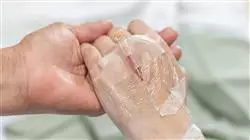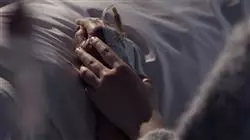University certificate
Scientific endorser

The world's largest faculty of medicine”
Introduction to the Program
The new scenarios in Home Hospitalization push us to propose new programs that meet the real needs of experienced professionals, so that they can incorporate advances in the specialty into their daily practice"

Demographic change calls for an extreme rethinking of healthcare to focus more on patient care. The increase in aging also brings with it an increase in chronic diseases. In fact, it is estimated that around 70% of elderly Spaniards suffer from at least one chronic disease. Although palliative care is mainly provided for diseases that can no longer be cured, such as advanced cancers, in the case of the elderly, this type of care is also important without the need to be an oncology patient, since certain types of chronic diseases can lead to the need for this type of care.
In these cases, home hospitalization is of the utmost importance, since patients will have less difficulty being treated at home than if they have to travel to hospitals, making home hospitalization the engine of change in modern health care, a care focused on people and their health, as well as social needs.
This program is oriented to delve into all those aspects that make Home Hospitalization unique and different from other medical specialties, but also to show the weaknesses and opportunities for the future that still lie ahead, taking advantage of new educational technologies.
With this Postgraduate diploma, students will learn how to manage infections at home, palliative care in oncology patients, pain treatment and the most innovative therapeutic and diagnostic techniques on the market, offering the doctor the most up-to-date program to provide the best care to their patients.
Take advantage of the opportunity to study with us and don't stop learning throughout your working life"
This Postgraduate diploma in Complex Chronic and Palliative Patient in Home Hospitalization contains the most complete and up-to-date scientific program on the market. The most important features include:
- More than 100 case studies presented by experts in home hospitalization, management of complex chronic patients and palliative care
- The graphic, schematic, and practical contents with which they are created provide scientific and practical information on the disciplines that are essential for professional practice
- New developments on the role of doctors and nurses in home hospitalization.
- Practical exercises where the self-evaluation process can be carried out to improve learning
- Algorithm-based interactive learning system for decision-making in the situations that are presented to the student
- Special emphasis on evidence-based medicine and research methodologies in home hospitalization
- Theoretical lessons, questions to the expert, debate forums on controversial topics, and individual reflection assignments
- Content that is accessible from any fixed or portable device with an Internet connection
With this Postgraduate diploma you have the opportunity to update your knowledge in a comfortable way and without renouncing the maximum scientific rigor, to incorporate the latest advances in the approach to the medical hospitalization of complex chronic and palliative patients in your daily medical practice"
The teaching staff is made up of prestigious and renowned professionals, with long careers in health care, teaching and research, who have worked in different hospitals throughout the country, garnering professional and teaching experience that is delivered in an extraordinary way in this Postgraduate diploma
The methodological design of this Postgraduate diploma, developed by a multidisciplinary team of e-learning experts, integrates the latest advances in educational technology for the creation of numerous multimedia educational tools that allow the professional, based primarily on problem-solving methodology, to face real scientific problems in their daily clinical practice, which will allow them to advance in the acquisition of knowledge and the development of skills that will impact their future professional work.
It should be noted that each of the contents generated in this Postgraduate diploma, as well as the videos, self-assessments, clinical cases and modular exams have been thoroughly reviewed, updated and integrated by the professors and the team of experts that make up the working group, in order to facilitate the learning process in a step-by-step and didactic manner to achieve the objectives of the teaching program.
This Postgraduate diploma integrates the latest advances in educational technology"

With this Postgraduate diploma you have the opportunity to update your knowledge in a comfortable way and without renouncing the maximum scientific rigor, to incorporate the latest advances in the approach to medical hospitalization of complex chronic and palliative patients in your daily medical practice"
Why study at TECH?
TECH is the world’s largest online university. With an impressive catalog of more than 14,000 university programs available in 11 languages, it is positioned as a leader in employability, with a 99% job placement rate. In addition, it relies on an enormous faculty of more than 6,000 professors of the highest international renown.

Study at the world's largest online university and guarantee your professional success. The future starts at TECH”
The world’s best online university according to FORBES
The prestigious Forbes magazine, specialized in business and finance, has highlighted TECH as “the world's best online university” This is what they have recently stated in an article in their digital edition in which they echo the success story of this institution, “thanks to the academic offer it provides, the selection of its teaching staff, and an innovative learning method aimed at educating the professionals of the future”
A revolutionary study method, a cutting-edge faculty and a practical focus: the key to TECH's success.
The most complete study plans on the university scene
TECH offers the most complete study plans on the university scene, with syllabuses that cover fundamental concepts and, at the same time, the main scientific advances in their specific scientific areas. In addition, these programs are continuously being updated to guarantee students the academic vanguard and the most in-demand professional skills. In this way, the university's qualifications provide its graduates with a significant advantage to propel their careers to success.
TECH offers the most comprehensive and intensive study plans on the current university scene.
A world-class teaching staff
TECH's teaching staff is made up of more than 6,000 professors with the highest international recognition. Professors, researchers and top executives of multinational companies, including Isaiah Covington, performance coach of the Boston Celtics; Magda Romanska, principal investigator at Harvard MetaLAB; Ignacio Wistumba, chairman of the department of translational molecular pathology at MD Anderson Cancer Center; and D.W. Pine, creative director of TIME magazine, among others.
Internationally renowned experts, specialized in different branches of Health, Technology, Communication and Business, form part of the TECH faculty.
A unique learning method
TECH is the first university to use Relearning in all its programs. It is the best online learning methodology, accredited with international teaching quality certifications, provided by prestigious educational agencies. In addition, this disruptive educational model is complemented with the “Case Method”, thereby setting up a unique online teaching strategy. Innovative teaching resources are also implemented, including detailed videos, infographics and interactive summaries.
TECH combines Relearning and the Case Method in all its university programs to guarantee excellent theoretical and practical learning, studying whenever and wherever you want.
The world's largest online university
TECH is the world’s largest online university. We are the largest educational institution, with the best and widest online educational catalog, one hundred percent online and covering the vast majority of areas of knowledge. We offer a large selection of our own degrees and accredited online undergraduate and postgraduate degrees. In total, more than 14,000 university degrees, in eleven different languages, make us the largest educational largest in the world.
TECH has the world's most extensive catalog of academic and official programs, available in more than 11 languages.
Google Premier Partner
The American technology giant has awarded TECH the Google Google Premier Partner badge. This award, which is only available to 3% of the world's companies, highlights the efficient, flexible and tailored experience that this university provides to students. The recognition as a Google Premier Partner not only accredits the maximum rigor, performance and investment in TECH's digital infrastructures, but also places this university as one of the world's leading technology companies.
Google has positioned TECH in the top 3% of the world's most important technology companies by awarding it its Google Premier Partner badge.
The official online university of the NBA
TECH is the official online university of the NBA. Thanks to our agreement with the biggest league in basketball, we offer our students exclusive university programs, as well as a wide variety of educational resources focused on the business of the league and other areas of the sports industry. Each program is made up of a uniquely designed syllabus and features exceptional guest hosts: professionals with a distinguished sports background who will offer their expertise on the most relevant topics.
TECH has been selected by the NBA, the world's top basketball league, as its official online university.
The top-rated university by its students
Students have positioned TECH as the world's top-rated university on the main review websites, with a highest rating of 4.9 out of 5, obtained from more than 1,000 reviews. These results consolidate TECH as the benchmark university institution at an international level, reflecting the excellence and positive impact of its educational model.” reflecting the excellence and positive impact of its educational model.”
TECH is the world’s top-rated university by its students.
Leaders in employability
TECH has managed to become the leading university in employability. 99% of its students obtain jobs in the academic field they have studied, within one year of completing any of the university's programs. A similar number achieve immediate career enhancement. All this thanks to a study methodology that bases its effectiveness on the acquisition of practical skills, which are absolutely necessary for professional development.
99% of TECH graduates find a job within a year of completing their studies.
Postgraduate Diploma in Complex Chronic and Palliative Care in Home Hospitalization
At TECH Global University, we present our Postgraduate Diploma program in Complex Chronic and Palliative Care in Home Hospitalization, designed for health professionals who wish to specialize in the care of complex chronic patients in the home environment. Our online classes will give you the flexibility to study from anywhere, anytime. You will be able to access high-quality educational content through our online platform, allowing you to progress at your own pace and tailor your studies to your schedule and needs. This program will provide you with the knowledge and skills necessary to provide comprehensive care to complex chronic and palliative patients in the home setting. You will learn to assess and manage common symptoms and complications in these patients, as well as implement care strategies focused on alleviating suffering and improving quality of life.
At TECH we have the best professionals
Our team of Postgraduate Diplomas in the healthcare field will guide you throughout the program, providing academic support and sharing their practical experience. In addition, you will have the opportunity to interact with other healthcare professionals online, which will foster the exchange of ideas and collaborative learning. Upon completion of the program, you will receive a certification recognized by TECH Global University, which will support your skills and knowledge in the care of complex chronic and palliative patients in home hospitalization. This certification will allow you to excel in the field of home care and open up new opportunities for professional development. Don't miss the opportunity to specialize in the care of complex chronic and palliative patients in the home setting. Enroll in our Postgraduate Diploma program in Complex Chronic and Palliative Chronic Patient in Home Hospitalization at TECH Global University and acquire the competencies necessary to provide quality and compassionate care to these patients.







